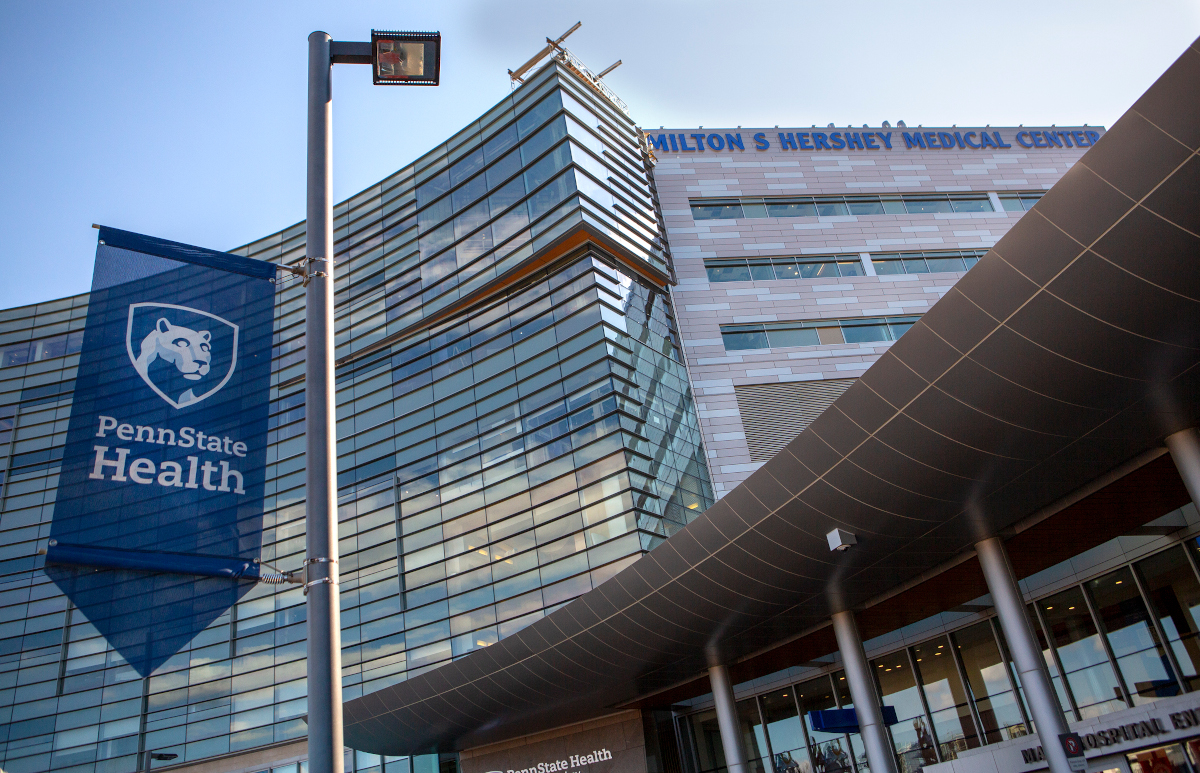Continued response to a pandemic, vaccination rollout and leading-edge clinical innovation shaped the 2020-2021 fiscal year

Learning how to live with COVID-19. Large-scale vaccination rollout. Adapting cutting-edge technology. Continued growth to serve the region. Deborah Berini, president of Penn State Health Milton S. Hershey Medical Center, shared the accomplishments of an extraordinary year during the hospital’s annual public Board of Directors meeting today.
Many of the details Berini shared highlight how the Milton S. Hershey Medical Center and Penn State College of Medicine continued to shape Penn State Health’s response to the COVID-19 pandemic, including providing care to patients with the highly infectious disease and supporting the system’s vaccination efforts throughout the region. From April 2020 to June 2021, Hershey Medical Center cared for 1,622 COVID inpatients with exceptional outcomes –– 27% fewer deaths, 23% lower intensive care unit days and 13% lower average lengths of stay compared to 100 similar comprehensive academic medical centers across the country. As vaccines for COVID-19 became available in December 2020, Hershey Medical Center participated in vaccinating staff, community health care providers and residents across central Pennsylvania.
“Despite the pandemic, Hershey Medical Center continued to advance its work as a locally based academic medical center by expanding clinical trials and investing in technology to provide world-class care close to where our patients live and work,” Berini said. “The commitment from our team to not only providing exceptional care, but innovating and enhancing that level of care right here, is remarkable.”
Hershey Medical Center is always striving to improve the quality and safety of its care. Fiscal year 2021 again demonstrated high overall outcomes and patient satisfaction, as well as national recognitions, including:
- For the eleventh consecutive year, Penn State Health Children’s Hospital is ranked among U.S. News and World Report’s best children’s hospitals.
- For the fifth consecutive year, U.S. News and World Report listed the Medical Center among the best hospitals in the nation for orthopedic care.
- Hershey Medical Center received its tenth consecutive “A” from the Leapfrog Hospital Safety Grade for our efforts to protect patients from harm and provide safe health care.
- Hershey Medical Center’s heart transplant team recorded a 100% survival rate for patients 30 days after surgery and a one-year post-surgery survival rate of 95.2%. This is the highest survival rates of any heart transplant program in Pennsylvania and among the best in the nation.
Hershey Medical Center continues to grow to serve its patients and their families. Last October, the health system completed a three-floor expansion of Penn State Health Children’s Hospital, which includes state-of-the-art technology, a new Women and Babies Center and a 56-bed Level 4 Neonatal Intensive Care Unit. This expansion allowed the Medical Center to open 50 more adult beds and begin converting additional space in the adult hospital into 54 modern, private adult rooms, which will be completed between 2022 and 2024.
In May, the new Cancer Institute Cancer Assistance and Resource Education (CARE) Center, opened. The first of its kind in the region, it provides patients and families with access to all the resources they need to navigate care and recovery, in one location.
A cornerstone of advanced health care is the use of the newest clinical technology to improve care outcomes and remove treatment barriers and challenges. Hershey Medical Center is one of only 17 health care systems in the nation offering a new cancer treatment, the MRIdian Radiation Therapy System, which delivers more effective radiation doses and minimizes exposure to surrounding organs. The Paragonix SherpaPak Cardiac Transport System revolutionizes the way hospitals receive donor hearts for transplant. Hershey Medical Center’s Transplant Program is the first in Pennsylvania and the 24th nationwide to use the device, which reduces life-threatening complications of heart transplant surgery.
“Not all technology is complex, but it is equally as important to our patients,” Berini said. In December 2020, with support from the Children’s Miracle Network, the Children’s Hospital purchased 56 Angel Eye cameras for every neonatal intensive care unit bed, which enables parents and families to see their babies using a smartphone app or a laptop.
Berini also looked to the future, speaking about Hershey Medical Center’s new five-year strategic plan, which is built on four themes: innovation, faculty and staff experience, patient experience and performance.
Dr. Kevin Black, interim dean of the College of Medicine, joined Berini to spotlight some of the College of Medicine’s success and speak to his strategic plan goals. This included:
- Medical Center and College of Medicine researchers earned nearly $155 million in external research funding in fiscal year 2021, an increase from more than $102 million in 2020. This money supports faculty and staff in scientific studies into the causes, treatments, cures and prevention of disease.
- College of Medicine students are well-prepared for residency training despite disruptions related to the COVID-19 pandemic: 99% passed their Step 1 medical licensing exam the first time (compared to 97% nationally), and in an annual Association of American Medical Colleges student survey, College of Medicine students indicate a greater level of educational experiences related to research, health systems, health care disparities and the underserved compared to their medical school peers nationally.
- Strategic plan partnership with Hershey Medical Center to translate science discovery to improve health and higher value care, and create an environment that allows faculty and staff to achieve their greatest potential.
If you're having trouble accessing this content, or would like it in another format, please email Penn State Health Marketing & Communications.
